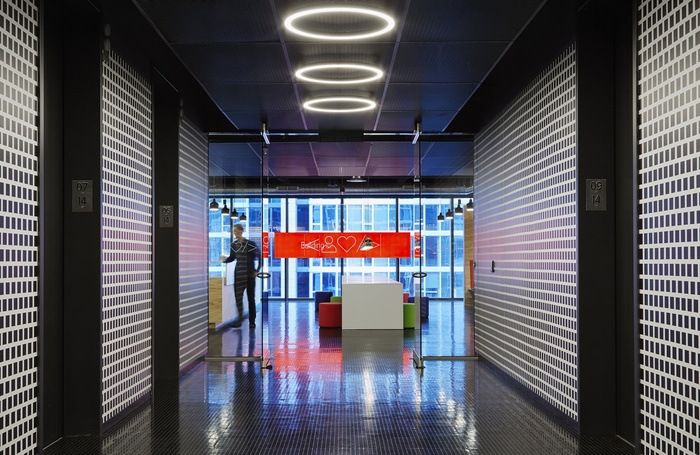“7 Scientific Ways to Learn Faster.”
“10 Brain Hacks To Learn Anything.”
“The Beginner’s Guide to Ultralearning.”
A quick online search for “learning strategies” will yield hundreds of results urging the reader to consume and master new skills — faster, better and more voraciously. But when it comes to staying in the vanguard of the software engineering field, Getty Images Senior Software Engineer Jacob Gulotta’s advice might surprise you.
Slow down, Gulotta says.
“It’s OK to lag a little, to not have every skill or know it all,” Gulotta told Built In Chicago. “It’s OK to take the slow, steady approach and invest in things that last.”
With the shelf life of software development trends becoming more abbreviated every year, Gulotta prefers a more tempered approach to self-improvement.
“I used to think that staying current meant that one had to operate on the bleeding edge,” he said. “Now, I value a more sustainable approach.”
Gulotta suggests finding a sense of balance, investing in trends that you find genuinely interesting, and staying abreast of the industry’s overall trajectory. Meanwhile, Grainger Software Engineering Practice Lead Jacob Tomaw recommends taking a step back to maintain a holistic view of the field beyond your role, and Morningstar Software Engineer Shivangi Bansal favors utilizing online resources.
Built In Chicago sat down with Gulotta, Tomaw and Bansal to learn more about how they maintain their edge in software engineering — sustainably and with resource savvy.

Grainger is a B2B supplier of maintenance, repair and operating supplies. As a broad-line distributor, Grainger offers more than 2 million maintenance, repair and operating products and services like technical support and inventory management.
What habits do you employ to develop your skills as an engineer? How does Grainger encourage you to do so?
As a software engineering practice lead, I am curious about everything. Occasionally I learn a new language or framework — but most of the time, I focus on staying abreast of what is happening in the industry by following a curated list of experts.
At Grainger, we give everyone space to learn, and much of my role is working to foster good software engineering practices. I mentor teams, engineering managers and tech leads to model the right communication behavior. I also lead the engineering community of practice, in which we have internal and external speakers teach specific skills to help us continuously improve the products we’re developing.
What specific tools or programs have been especially helpful in your professional development?
We have subscriptions to a number of online learning platforms, which allow me to get cursory knowledge about a whole bunch of things and are great resources for our teams. Both internal and external resources, as well as leading internal work and leading Grainger’s engineering community of practice have been extremely valuable to my own growth.
In the community, we gather twice a month. Recent topics have included the AWS-based internal Grainger Platform, Akamai, MongoDB and The Grainger design system for sharing React components. The best part is making our large engineering group feel like a tight-knit team by sharing the great work everyone is doing, gaining inspiration through it and learning how to do it yourself.
Our engineering enablement team also has a robust Dojo practice, which provides us with great coaching and ideas for how we can improve our engineering practice. In 2022, we had 60 engagements across development, integration, security, testing and more.
Are there particular challenges that you have encountered to staying current with — and growing — your skills and knowledge?
Early in my career, I was hired as an engineer. There wasn’t differentiation between front-end and back-end engineers, I just did everything. Along the way, my career took a path towards back-end engineering, and I didn’t realize the company I was working for at the time had started segmenting the work until they started hiring specific front-end engineers.
As people get more specialized, they get more siloed. Even in companies at the forefront of adopting best practices, people can get isolated into one thing. You have to be thoughtful and proactive in managing your career.
The technology itself translates between companies, but organizational structures don’t. Standard titles don’t exist. My advice is that if you find yourself isolated in one area, you may need to take a step back on the role ladder to learn. There’s merit to retraining, certifications and getting to the basics. If you’re great, you’ll accelerate quickly.
Technology translates between companies, but organizational structures don’t. You may need to take a step back on the role ladder to learn.”
I appreciate that, at Grainger, engineers are encouraged to move across domains, gain breadth and depth of knowledge, and keep our skills and experiences current and well-rounded.

As a fintech company, Morningstar, Inc. strives to build great products in-house in a highly collaborative, agile environment, focusing on technical excellence, the user experience and continuous improvement.
What habits or routines do you employ to develop your skills as an engineer? How does Morningstar encourage you to do so?
As a software engineer, I try to keep myself updated with the latest technologies and frameworks by taking online courses on Udemy or Coursera. I also have short-term goals that help me to stay focused and achieve my long-term goals.
Morningstar provides free LinkedIn courses and $1,000 in assistance to attend seminars, conferences and online courses. In December 2022, an agile workshop helped me achieve a better understanding of the methodology and how best it can be applied within our teams.
What specific tools or programs have been especially helpful in your professional development?
Online courses available on LinkedIn, Udemy and Coursera. These online courses are designed by industry professionals and include short assignments that provide hands-on experience — sometimes capstone projects that affirm I can use the new skill without any assistance. I always add the finished project to my GitHub account.
These online courses include short assignments that provide hands-on experience … I can use the new skill without any assistance.”
Are there particular challenges that you have encountered to staying current with — and growing — your skills and knowledge?
The biggest challenge I have encountered is keeping myself current with front-end technologies. The front-end world is always updating, and new languages and frameworks are added constantly. It can be difficult to keep pace with all the new advancements.
The advice I can offer to individuals and teams to cope with this change is to learn about the new languages — even without hands-on experience — to be aware of what changes are made to the frameworks.
Getty Images is a global visual content creator and marketplace, delivering visual content to power its customers’ commerce and ideas and connect to their audience.
What habits do you employ to develop your skills as an engineer? How does Getty Images encourage you to do so?
My specific efforts to improve my skills have evolved over the years. I believe it’s important to actively seek new technical educational content — whether it’s learning through blog posts, academic papers, magazine articles, books or recorded talks from conferences, all can be extremely resourceful to staying relevant.
Another area I employ regularly is actively criticizing the code I read and write. A little bit of code can convey a lot more than appears on the surface. A little bit of introspection or assuming an alternate perspective can yield dramatic insights, which can inform how the code should change or evolve to achieve whatever facets you are prioritizing.
I also prioritize the understanding of core principles. Everything related to software involves some tradeoffs — from the code that gets written on your computer to the hardware it runs on in the data center. Getty Images fosters a culture of learning and sharing knowledge through conference attendance, internal programs and company-led hackathon events, all of which I highly value and appreciate as a member of the technology team.
What specific tools or programs have been especially helpful in your professional development?
My approach has largely been to draw from a wide variety of sources and integrate little bits into my repertoire and skill set. If I had to pick one broad resource, I’d say the extensive archive of conferences available on YouTube, specifically “The Strange Loop.” These talks are consistently high quality, varied and interesting, often representing the latest ideas, techniques and developments in whichever field is on display.
Draw from a wide variety of sources and integrate little bits into your repertoire and skill set.”
Experiment in a way that’s outside your comfort zone. Since my focus is software, a few examples might be trying something like static like C# if you normally work with highly dynamic languages like Python, trying something immutable if you normally work with mutable code or trying to make a graphical UI if you normally work on the backend.
One-off tools make an excellent playground for these kinds of tests. Whether the experiment has a successful result, the process helps refine my view of why things are the way they are, when they should be different or even how software fundamentally works. It’s often worth diving deeper into something that changes how you think.
Are there particular challenges that you have encountered to staying current with — and growing — your skills and knowledge?
I heavily associate the term “current” with “latest” or “trend” — often fads that will not necessarily stick around over time.
A more practical and worthwhile but tempered phrase is “staying relevant.” I feel what is generally considered current changes too rapidly for it to be possible to stay current. Current ideas, good and bad, are often abandoned. Relevant ideas, good and bad, tend to last a while.
Most issues are mitigated with a bit of balance: Maybe you try to stay current, but only on a few aspects that actively interest you, or maybe you don’t want to feel left behind, so you keep a general sense of where things are heading. Eventually, you will acquire skills and knowledge both for what you care about, as well as for what is merely practical.










